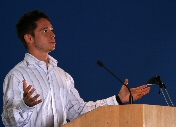Checklist for speakers
This checklist for speakers and speechwriters will help you get your message across and engage your audience to keep them listening. Obviously these points do not work in every situation but work like magic when your goal is to inform and entertain your audience.
So if you are giving a business presentation, a talk to a civic group or a tribute at an awards ceremony, this checklist for speakers will help you make the best use of the material you have to present and keep your listeners looking at you instead of their watches.
Key questions in a checklist for speakers
Can I sum up my key message in one sentence?
Defining exactly what message you are trying to convey will help you focus your speech, keep you from rambling and ensure that all parts of your talk enhance your central message. You should have a clear idea of the major point of your speech before you start.
 Photo from Neustock images, iStockphoto.com. Being a good speaker requires practice, checking your microphone, and the smile doesn't hurt either.
Photo from Neustock images, iStockphoto.com. Being a good speaker requires practice, checking your microphone, and the smile doesn't hurt either.Does my attention-getter make my audience want to hear more?
Except for the conclusion, your opening is the most important part of a speech. You have only a few seconds to gain the audience's attention and if you miss this golden opportunity, you may never win back their undivided attention.
How do you start a speech in a captivating way? Here are some of the most common openers:
- Telling a story.
- Using a memorable quote,
- Telling a joke.
- Giving a surprising statistic or interesting piece of data,
- Asking a question -- real or rhetorical.
(Note: an effective opening question is not How are you all doing today? Ask that if you must but then give your audience something else.)
For some great examples of effective speech openers from famous speakers, check out this page on the Science of People.
Do I state my key message in the first minute or two?
That does not mean the first words out of your mouth should be "Today I'm going to talk about...." That is a boring opener. You are taking listeners on an audible trip so let them know the destination or purpose of your speech in the first minute or two.
Can I refer to some people in the audience?
Mentioning someone in the audience by name is guaranteed to draw attention to what you are saying. A good a technique is to work in references to listeners in the middle of your speech when minds tend to wander.
If you don't know anyone in your audience, do some research ahead of time to find out the interests of one or two people. Even a brief comment will perk up your audience. For example, if you meet someone in your audience who is from Montana, you might say, The reaction to our first project was as cold as January in Jim Tate's hometown in Montana. Sprinkle tiny references throughout your speech to people in your audience to keep listeners engaged..
Can I enhance my points with examples, facts and stories?
You must paint a verbal picture to keep your audience's attention. Sharing a personal story helps you develop an emotional connection with your listeners.
Do I use repetition effectively?
A key phrase repeated in your speech, especially at the conclusion, will give your talk unity and make it memorable. The greatest speeches always employ repetition. Just remember Martin Luther King or President Barrack Obama.

Is my delivery energetic with appropriate pauses, hand gestures and movement?
Practicing is the only way to become comfortable with your natural style. We all know how deadly unenergetic speakers can be. Rehearsing is how you can get beyond your self-consciousness about being animated.
Mark your copy with places for emphasis and for those all-important pauses.
Stay within your comfort level and adapt your style to the situation but show the audience some enthusiasm. After all, if you are not excited about your topic, how can you expect them to care?
Are my visual aids adding to my message or am I expecting them to carry too much weight?
Let PowerPoint supplement your message with good visuals and variety. Whatever you do, don't turn around and just read from the screen. Guy Kawasaki has a useful 10-20-30 rule for PowerPoint presentations that keeps presenters from killing their audiences with bullet points.
Alas, the ubiquity of PowerPoint presentations in the business and educational worlds gave rise to the Death-by-PowerPoint industry which was most artfully exploited by engineer-turned-comedian Don McMillan.
One final thought: When you see speakers such as the late Steve Jobs who appeared to just walk out on stage and speak off the cuff, don't be fooled. They've practiced hours to achieve that nonchalance. As an example, one speaker coach who made a fortune speaking to conventions and then teaching others his secrets said that he'd rehearse a speech 40 or 50 times. His goal? He wanted to know his remarks so well that when he came on stage, he would be just having a conversation with the audience. That's how a speaker achieves a level of closeness with hundreds of people.
Can I deliver my conclusion in a persuasive, confident manner?
Treat your conclusion as a separate speech and practice it repeatedly so that you don't have to think about it. Your final words are your chance to tie everything together and have an impact on your audience. Don't blow it. Make those closing words memorable.
Finally, end smoothly. I'm a believer in a punchy, professional ending. That means delivering your conclusion, then pausing for a couple of seconds and simply saying Thank you.
You don't need to ramble on and on with Thank you for your time...I'm so glad to have had the chance to speak with you... yada yada yada. Such verbal gibberish pours cold water on any impact your final statement might have had.
All advice on this site was written by humans. No copy was written by AI.
Please support real writers.


